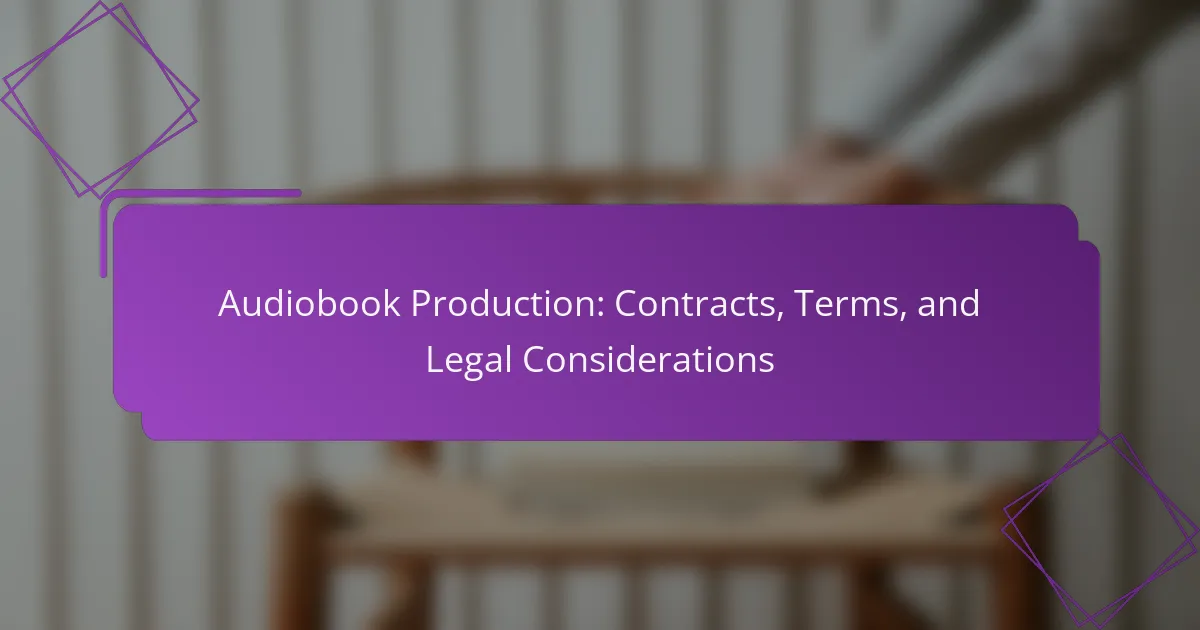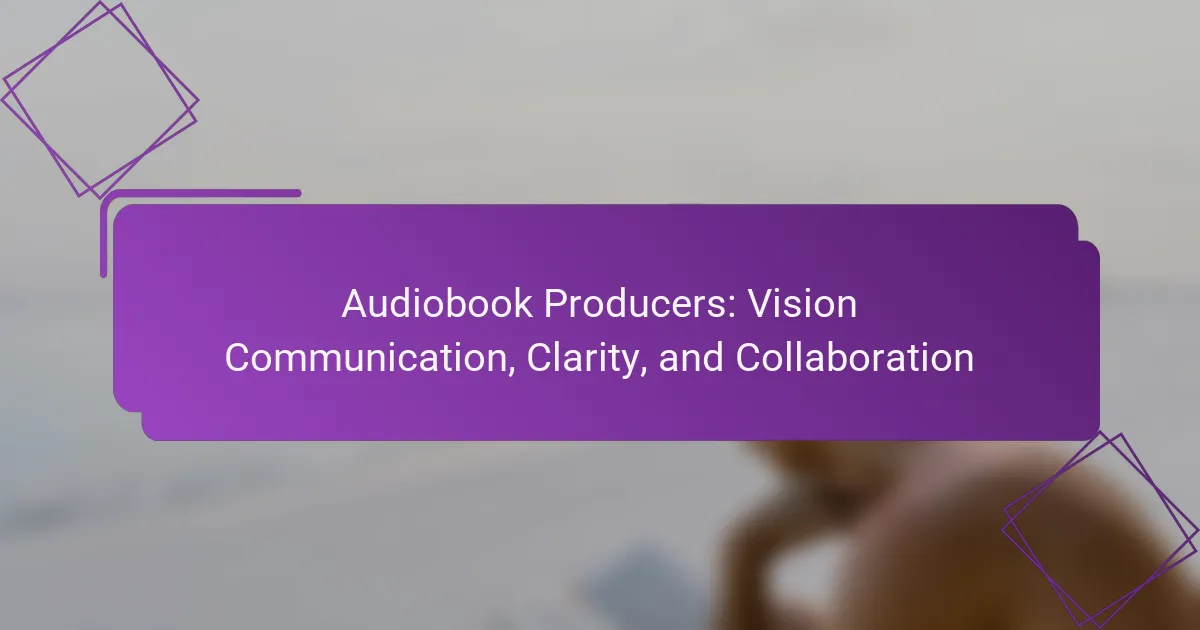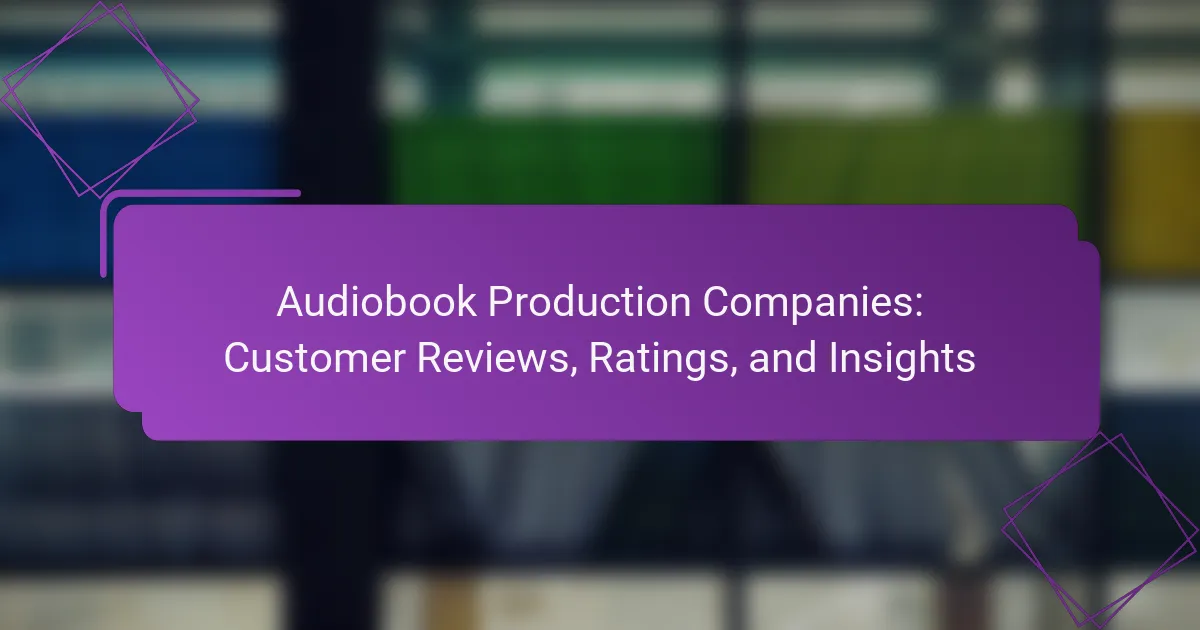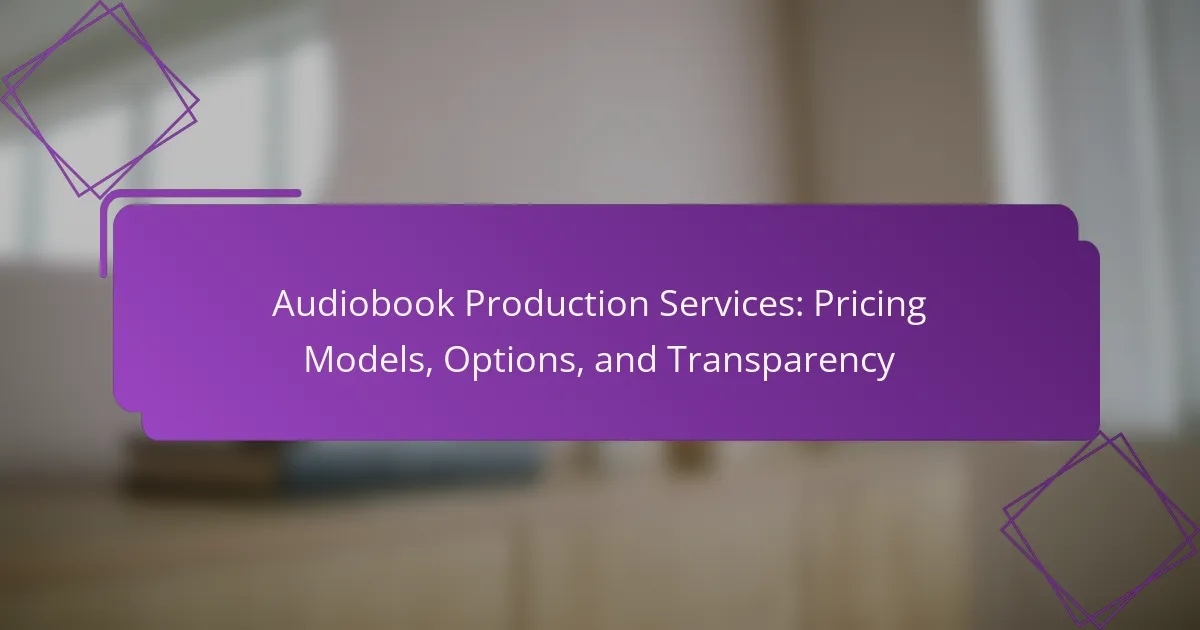Audiobook production involves a complex web of contracts that define the roles and responsibilities of all parties, including producers, authors, narrators, and distributors. Clear agreements are vital to protect the interests of everyone involved, outlining essential terms such as payment structures, rights granted, and delivery timelines. Understanding these legal considerations, including royalty arrangements, is crucial for ensuring fair compensation and a smooth production process.
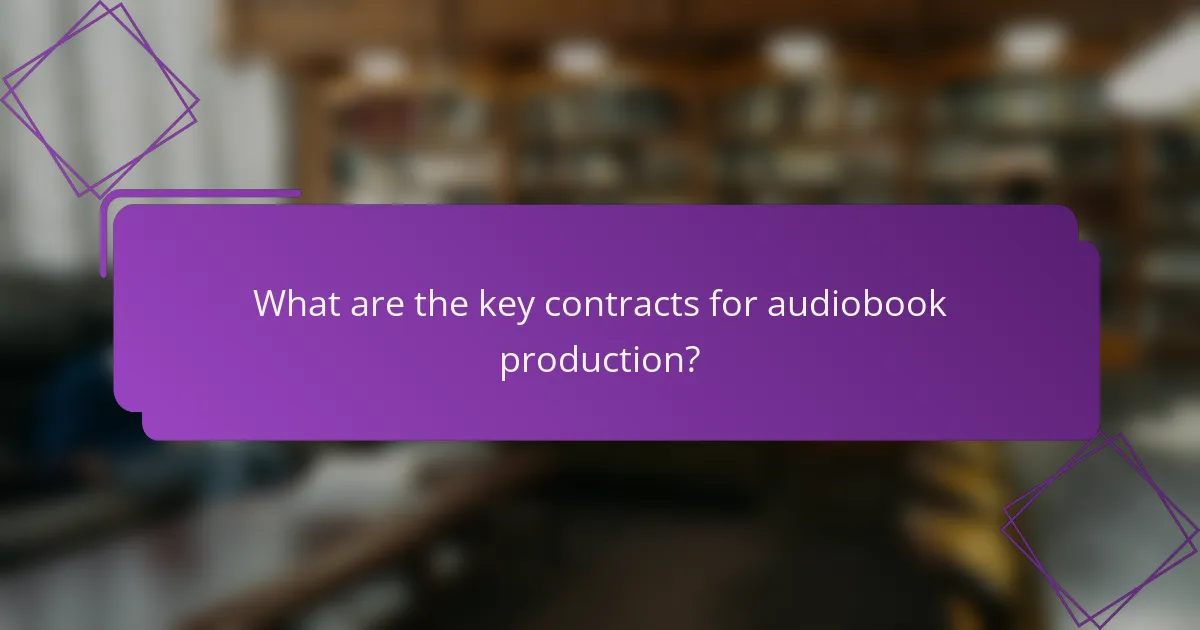
What are the key contracts for audiobook production?
The key contracts for audiobook production include agreements that outline the responsibilities and rights of all parties involved. These contracts are essential for ensuring clarity and protecting the interests of producers, authors, narrators, and distributors.
Production agreement
A production agreement defines the terms under which the audiobook will be created. It typically covers aspects such as timelines, payment structures, and the responsibilities of each party involved in the production process.
Key considerations include the scope of work, quality standards, and any specific requirements for the final product. It’s crucial to ensure that all parties agree on these terms to avoid disputes later on.
Distribution agreement
A distribution agreement outlines how the finished audiobook will be marketed and sold. This contract specifies the distribution channels, territories, and any exclusivity arrangements that may apply.
When negotiating a distribution agreement, consider factors such as revenue sharing, marketing support, and the duration of the agreement. Clear terms can help maximize the audiobook’s reach and profitability.
Licensing agreement
A licensing agreement grants permission for the use of copyrighted material in the audiobook. This can include the text of the book, music, or other intellectual property that may be incorporated.
It’s important to specify the duration of the license, the territories in which it applies, and any fees involved. Understanding these terms helps avoid potential legal issues regarding copyright infringement.
Royalty agreement
A royalty agreement outlines how profits from the audiobook will be shared among the parties involved. This typically includes the percentage of sales that will be paid to the author, narrator, and producer.
Common structures include fixed percentages or tiered royalties based on sales performance. Clearly defined terms can prevent misunderstandings and ensure fair compensation for all contributors.
Work-for-hire agreement
A work-for-hire agreement establishes that the creator of the audiobook content, such as the narrator or producer, does not retain ownership of the work. Instead, the rights are transferred to the hiring party.
This type of agreement is essential for producers who want to own the final product outright. It’s important to clearly outline the scope of work and compensation to avoid future disputes over ownership rights.
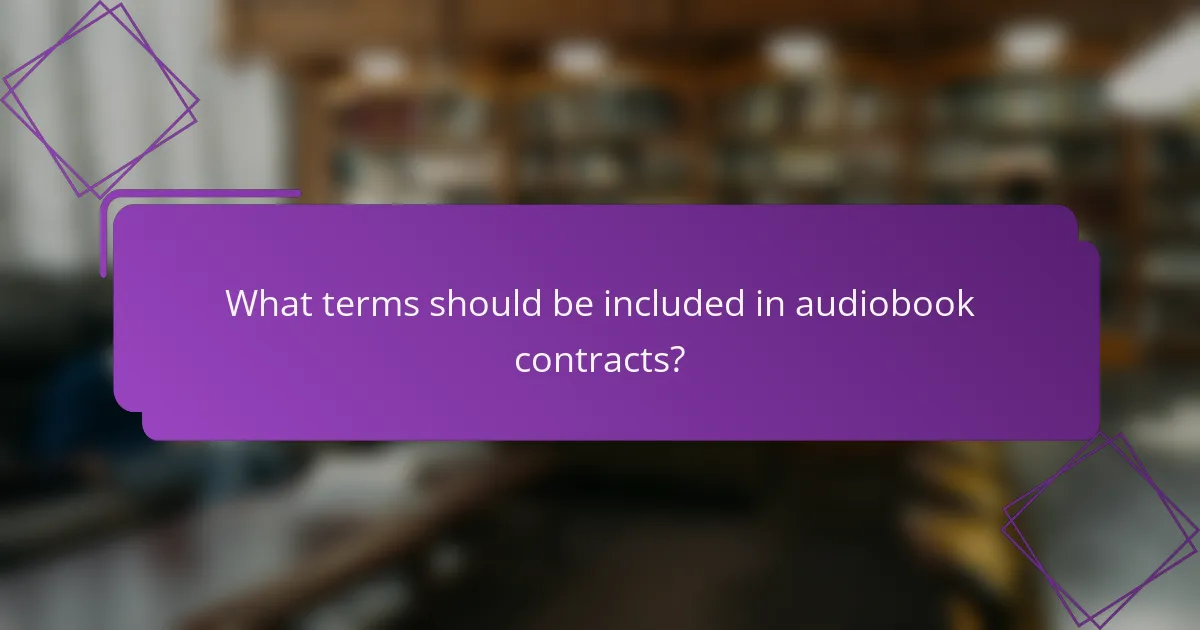
What terms should be included in audiobook contracts?
Audiobook contracts should clearly outline key terms that protect both the producer and the author. Essential elements include payment terms, rights granted, delivery timelines, and termination clauses, ensuring all parties understand their obligations and benefits.
Payment terms
Payment terms in audiobook contracts specify how and when the author or narrator will be compensated. This can include upfront fees, royalties based on sales, or a combination of both. It’s common to see royalties ranging from 15% to 25% of net sales, depending on the distribution platform.
Consider including details about payment schedules, such as monthly or quarterly payments, and any conditions that might affect these payments, like returns or refunds. Clear payment terms help prevent disputes and ensure timely compensation.
Rights granted
The rights granted section defines what permissions the producer has regarding the audiobook’s use and distribution. This typically includes rights to distribute the audiobook across various platforms, such as Audible or iTunes, and may also cover adaptations into other formats.
It’s crucial to specify whether the rights are exclusive or non-exclusive, as this impacts future opportunities for both parties. Authors might retain certain rights, such as print or translation rights, which should be clearly stated to avoid misunderstandings.
Delivery timelines
Delivery timelines outline when the audiobook must be completed and delivered to the producer or publisher. This includes deadlines for initial recordings, revisions, and final production. Setting clear timelines helps manage expectations and keeps the project on track.
Consider including penalties for late delivery or incentives for early completion to encourage adherence to the schedule. Typical timelines can vary widely, but a range of 6 to 12 weeks for production is common, depending on the project’s complexity.
Termination clauses
Termination clauses specify the conditions under which either party can end the contract. This may include breaches of contract, failure to meet deadlines, or mutual agreement. Clear termination terms protect both parties and provide a way out if the partnership is not working.
It’s advisable to outline the notice period required for termination and any obligations that remain post-termination, such as payment for completed work or rights to previously granted licenses. This clarity helps prevent legal disputes and ensures a smooth transition if the contract ends.
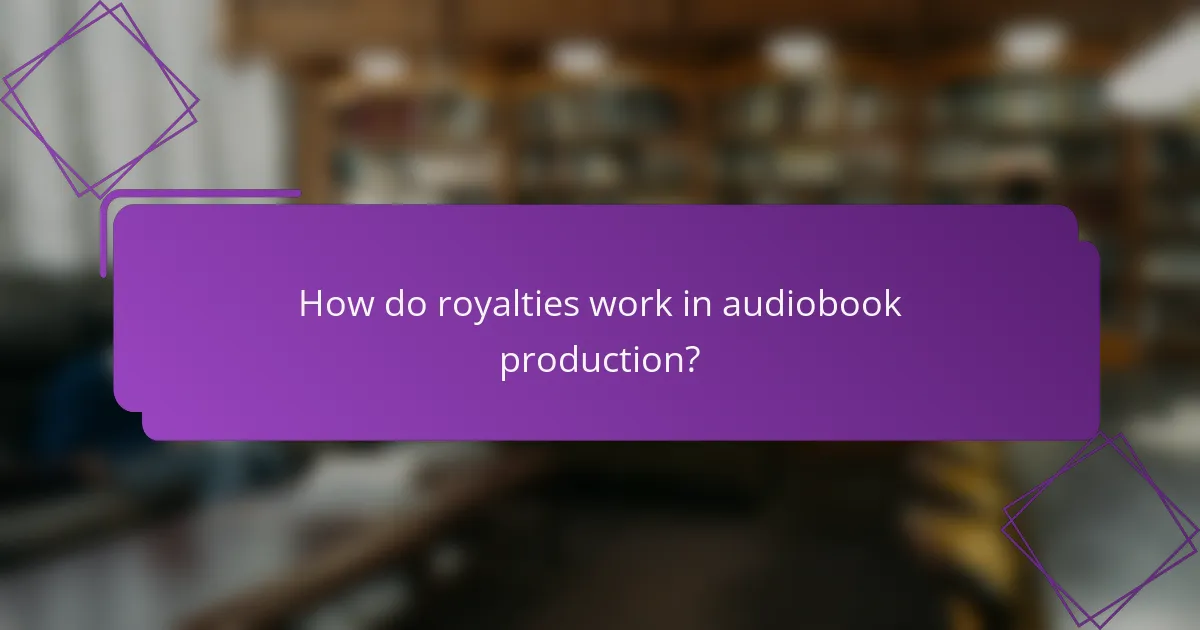
How do royalties work in audiobook production?
Royalties in audiobook production typically involve a percentage of sales or a flat fee paid to the rights holder or narrator. Understanding how these royalties are structured is crucial for both authors and producers to ensure fair compensation for their work.
Percentage of sales
Royalties based on a percentage of sales are common in audiobook production. Typically, this percentage can range from 15% to 25% of the net sales price, depending on the agreement between the parties involved. Authors and narrators should negotiate this percentage based on their contribution and the market standards.
It’s important to clarify whether the percentage is calculated from gross sales or net sales, as this can significantly affect the total earnings. Always ensure that the terms are clearly outlined in the contract to avoid misunderstandings later.
Flat fee vs. royalties
In audiobook production, creators may choose between a flat fee or royalties. A flat fee provides immediate payment, which can be beneficial for those who prefer upfront compensation. However, this option may limit potential earnings if the audiobook becomes a bestseller.
On the other hand, royalties can lead to higher long-term earnings if the audiobook sells well over time. Weighing the pros and cons of each option is essential, as the choice can impact overall income and financial planning.
Advance payments
Advance payments are often offered to authors or narrators before the audiobook is released. This payment is typically deducted from future royalties, meaning the creator will not receive additional royalties until the advance is recouped. Advances can range from a few hundred to several thousand dollars, depending on the project and the creator’s track record.
When negotiating an advance, consider the potential sales of the audiobook and how quickly you expect to recoup the advance. It’s crucial to have a clear understanding of how advances affect future earnings to make informed decisions during contract negotiations.
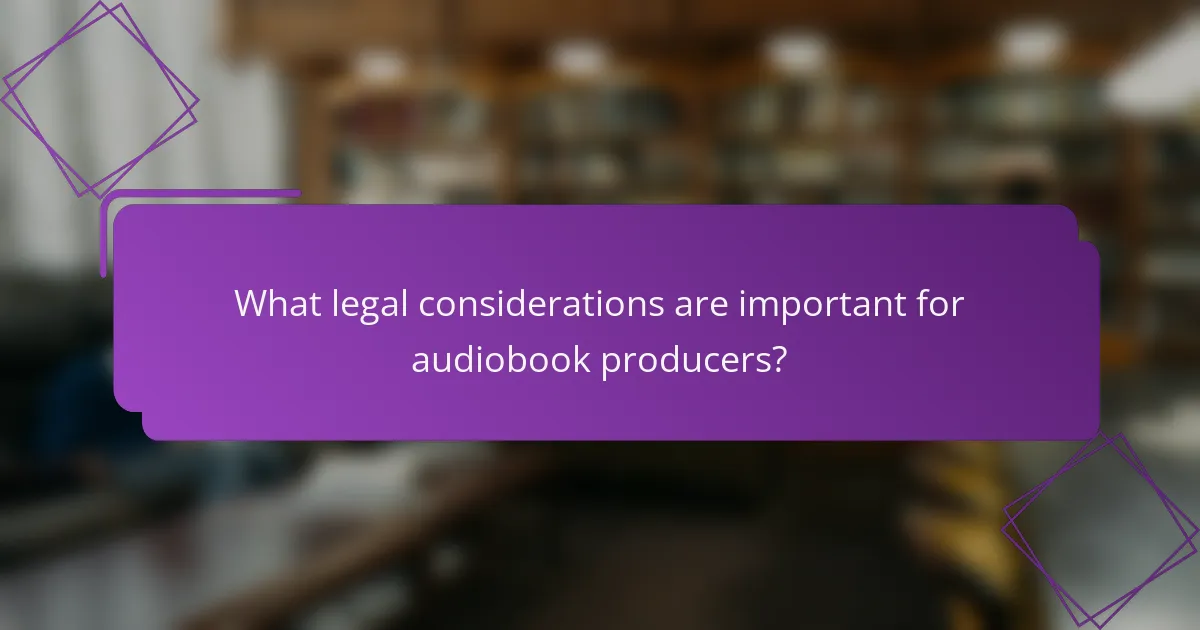
What legal considerations are important for audiobook producers?
Audiobook producers must navigate various legal considerations, including copyright laws, fair use doctrine, and trademark issues. Understanding these aspects is crucial to avoid legal disputes and ensure compliance with intellectual property regulations.
Copyright laws
Copyright laws protect the original works of authors, including the text that is transformed into audiobooks. Producers need to secure the necessary rights from authors or publishers to legally produce and distribute the audiobook.
Typically, this involves negotiating a licensing agreement that outlines the terms of use, duration, and any royalties owed. Producers should be aware that copyright infringement can lead to significant legal penalties, including fines and the potential for litigation.
Fair use doctrine
The fair use doctrine allows limited use of copyrighted material without permission under certain circumstances. For audiobook producers, this might include using brief excerpts for commentary, criticism, or educational purposes.
However, fair use is subjective and depends on factors such as the purpose of use, the amount of material used, and the effect on the market value of the original work. Producers should consult legal counsel to assess whether their use qualifies as fair use to avoid potential legal issues.
Trademark issues
Trademark issues can arise when an audiobook producer uses brand names, logos, or other protected identifiers in their content. It is essential to ensure that any trademarks used do not infringe on the rights of the trademark owner.
Producers should conduct thorough research to identify any potential trademark conflicts and consider obtaining permission when necessary. This helps prevent legal disputes and protects the integrity of the audiobook production.
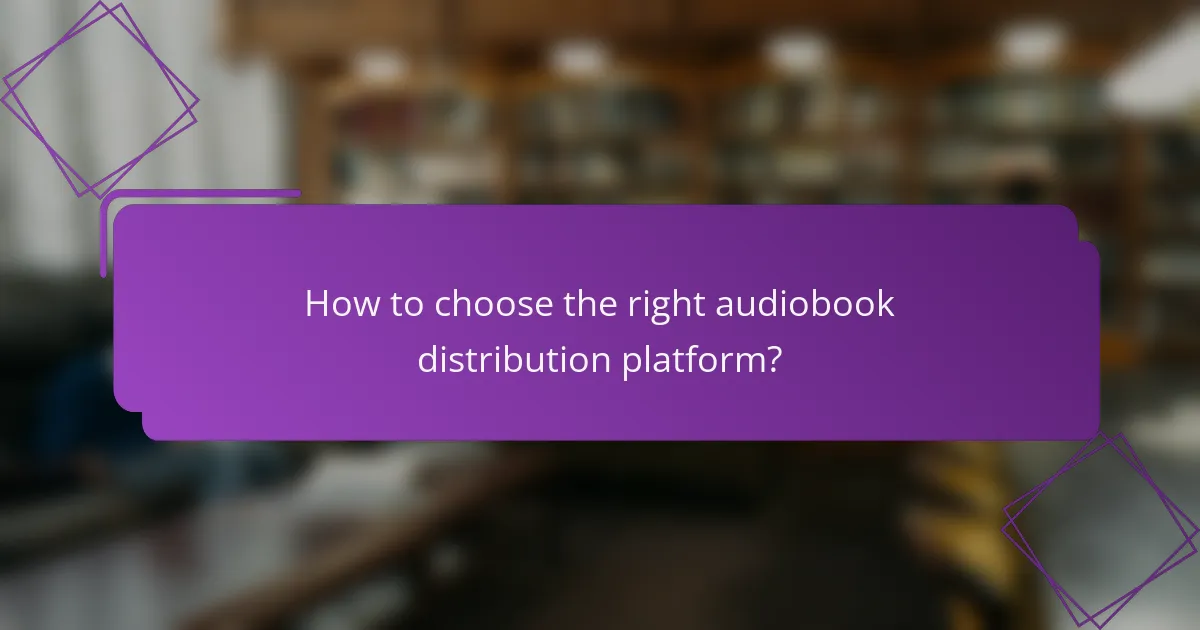
How to choose the right audiobook distribution platform?
Choosing the right audiobook distribution platform involves evaluating factors such as reach, royalties, and ease of use. Consider your target audience, the platforms they frequent, and the financial implications of each option.
Amazon Audible
Amazon Audible is one of the largest audiobook distribution platforms, offering extensive reach to a global audience. It operates on a subscription model, where users pay a monthly fee for access to a library of audiobooks.
When distributing through Audible, authors typically receive royalties ranging from 25% to 40% depending on whether they choose exclusive or non-exclusive distribution. Exclusive agreements can yield higher royalties but limit distribution options.
To maximize your success on Audible, ensure your audiobook is well-produced and marketed effectively. Utilize Audible’s promotional tools to boost visibility and consider pricing strategies that align with consumer expectations.
Findaway Voices
Findaway Voices offers a flexible distribution model, allowing authors to reach multiple platforms, including libraries and retail stores. This service is particularly beneficial for those looking to diversify their distribution channels.
Royalties with Findaway Voices can vary, but authors generally earn around 60% of the retail price. This platform also provides tools for marketing and analytics, helping authors track performance across different outlets.
When using Findaway Voices, consider the importance of metadata and cover design, as these elements significantly impact discoverability. Take advantage of their global reach to tap into international markets.
Libsyn
Libsyn is primarily known for podcast hosting but also offers audiobook distribution services. It is a suitable option for authors who want to leverage their existing podcast audience or create a combined content strategy.
With Libsyn, authors can expect to retain a larger share of their earnings, typically around 70% of the revenue generated. However, the platform may not have the same level of audiobook-specific features as dedicated services.
To effectively use Libsyn for audiobook distribution, focus on building a strong online presence and engaging your audience through social media. Regularly update your content and consider cross-promoting your audiobooks with your podcast episodes to maximize reach.
